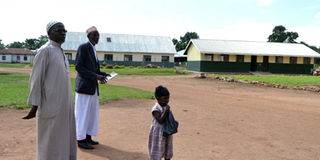Muslims in blame game as teaching institute declines

Training facility. Sheikh Ali Mutyaba, one of the caretakers of Katuumu Islamic Institute (left), with another faithful inspect the facility last week. PHOTO BY DAN WANDERA
What you need to know:
- In 1972, the former president, Idi Amin forcefully united Muslims under the umbrella of UMSC.
- Those opposed to Sheikh Mubajje’s leadership took the matter to court which exonerated him.
More than 70 per cent of the top Muslim leaders in Uganda have been moulded by Katuumu Islamic Institute, Sheikh Musa Ssemogerere, the head of Kasana – Luweero District Muslim County (Twale), says.
The institute at Katuumu Village about 6kms north of Luweero Town, was founded in 1947 by one of the country’s leading Muslim clerics and first Mufti of Uganda, the late Sheikh Swaibu Ssemakula.
The institute is credited to have produced some of the country’s top Muslim leaders, including late Sheikh Zubair Kayongo (Supreme Mufti for the Kibuli faction 2009-2015), late Sheikh Ahmed Mukasa (served as the interim Mufti of Uganda from 1993 until 2001), late Sheikh Saad Luwemba (Mufti of Uganda in 2001) and Dr Kadhir Balonde, the chairman of Uganda Muslim Supreme Council.
However, the institute is currently in a deplorable state, something that has raised debate among former students and faithful.
Several senior Muslim scholars accuse the faithful and old students of failing to recognise the importance of the once famous school.
Sheikh Ssemogerere, who is one of the institute’s caretakers, acknowledges that Katuumu has been abandoned by Muslim scholars.
“More than 70 per cent of the top Muslim leaders in Uganda have gone through the institute. I also believe that the current state of the institute is demanding. Had it not been our friends from Turkey under SENA Foundation who renovated some of the buildings, the situation would be ugly,” Sheikh Ssemogerere says.
“The word Katuumu sounds bigger than the structures you see at institute because of the rich history the place as an Islamic training centre in Uganda,” he adds.
Sheikh Ssemogerere’s observation is not different from that of his brother, Sheikh Ali Mutyaba, who describes the institute as a foundation pillar which has propelled the Islamic teaching and leadership. Sheikh Mutyaba is an elder son of the late Sheikh Swaibu Ssemakula.
“We are lucky to be associated with Katuumu as an Islamic training centre for both the youth and old Muslims who wish to learn more about the Islamic faith. The products from this great institute have turned out to be district Khadis among other Muslim leaders at various levels,” Sheikh Mutyaba says.
“The sorry state for the facility deemed to be the epitome of Islamic faith learning in the country is partly attributed to the setbacks experienced in the 1971 war (Amin’s coup) when goons looted the school infrastructure and burnt down the Islamic books, among other properties,” he adds.
According to Uganda Muslim Supreme Council (UMSC) spokesperson Nsereko Mutumba, Katuumu is a memorial Islamic training centre with a rich history and background to Islamic studies in Uganda.
“The foundation of the school is firmly grounded on the family of the late Sheikh Swaibu Ssemakula with little opportunity for people outside the family to directly engage in the management of the institute. As Muslim leaders, the doors are open, we have always made recommendations to the donors whenever the management of the institute seeks our assistance,” Mr Mutumba says.
“It is not easy for us to forcefully make interventions without any official invitation from the management at Katuumu,” he adds.
Mr Mutumba also denies allegations by a section of Muslims who claim that Katuumu has been neglected by UMSC.
Mr Musa Kakande, the chairperson Greater Luweero Muslim community, says at one time, enrolment of both the institute and primary section stood at 600, but it has declined over time with only 80 students currently at the institute and 250 at the primary section. Mr Kakande says in the past, the institute used to attract students from across the country but current students come from Greater Luweero and parts of Wakiso.
“It would be imperative for the leadership and family members who constitute the leadership at Katuumu to allow the Muslim community contribute positively to the revamping of this great institute,” he sys.
Sheikh Muhammad Kyazze, a director at the institute, says it is unfair for individuals to apportion blame on the family members of its founding father.
“We have played our part as the family and we welcome all the positive contributions to see Katuumu regain its former glory as a leading Islamic faith training centre in Uganda,” he says.
However, Sheikh Swaibu Ndugga, the Khadi for Greater Masaka sub-region, and an old boy of the institute, blames its poor state on divisions.
“It is public knowledge that divisions among us have cost us a lot and such institutes could be managed well if we were united as a community.Our top leaders should consider this issue [unity]as a matter of urgency so that we can develop the community together,” he says.
In 1972, the former president, Idi Amin forcefully united Muslims under the umbrella of UMSC. However, the unity was short-lived as his reign came to an end in 1979.
Muslims reunited again in 2000 shortly after the election of the incumbent Mufti, Sheikh Mubajje, but broke up only a few years later accusing his leadership of illegally disposing off Muslim property at William Street in Kampala.
Those opposed to Sheikh Mubajje’s leadership took the matter to court which exonerated him. They were, however, dissatisfied with the ruling and went ahead to establish a parallel leadership based at Kibuli mosque.
As a result, President Museveni appointed the Prof Tarsis Kabwegyere-led commission to inquire into the perennial Muslim wrangles and make appropriate recommendations for implementation.
One of the recommendations was to dissolve the parallel administrations. However, the recommendations of the report are yet to be implemented.




